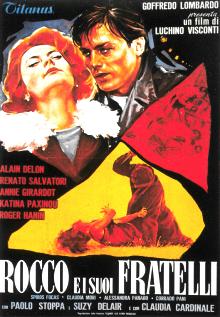| Rocco and His Brothers | |
|---|---|
 Italian theatrical release poster | |
| Italian | Rocco e i suoi fratelli |
| Directed by | Luchino Visconti |
| Screenplay by | Suso Cecchi D'Amico Pasquale Festa Campanile Massimo Franciosa Enrico Medioli Luchino Visconti |
| Story by | Luchino Visconti Suso Cecchi d'Amico Vasco Pratolini |
| Based on | Il ponte della Ghisolfa by Giovanni Testori |
| Produced by | Goffredo Lombardo |
| Starring | |
| Cinematography | Giuseppe Rotunno |
| Edited by | Mario Serandrei |
| Music by | Nino Rota |
Production company |
|
| Distributed by |
|
Release dates |
|
Running time | 177 minutes |
| Countries | |
| Language | Italian |
| Box office | |
Rocco and His Brothers (Italian: Rocco e i suoi fratelli) is a 1960 drama film directed by Luchino Visconti and starring Alain Delon, Annie Girardot, Renato Salvatori, Katina Paxinou, Roger Hanin, Paolo Stoppa, and Claudia Cardinale in one of her early roles. Set in 1960 Milan, it tells the story of a migrant family from southern Italy and its disintegration in the society of the industrial north.
The film's title is a combination of the title of Thomas Mann's novel Joseph and His Brothers and Rocco Scotellaro, an Italian poet who described the feelings of the peasants of southern Italy.[4] The screenplay, co-written by Visconti, is inspired by an episode from the novel Il ponte della Ghisolfa by Giovanni Testori.
A co-production between Italian studio Titanus and French production company Les Films Marceau,[1] Rocco and His Brothers suffered from multiple controversies and setbacks in its pre-release period.[5] It received a lukewarm response from Italian critics, but was more positively-received internationally, winning several accolades including the Special Jury Prize at the 21st Venice International Film Festival. Retrospective reviews were more positive, and the film is now highly regarded in the canon of Italian cinema.[6]
In 2008, the film was included on the Italian Ministry of Cultural Heritage’s 100 Italian films to be saved, a list of 100 films that "have changed the collective memory of the country between 1942 and 1978."[7]
- ^ a b c "ROCCO E I SUOI FRATELLI (1960)". BFI. Archived from the original on March 13, 2016. Retrieved 2021-11-10.
- ^ "Box Office information for Rocco and His Brothers". Box Office Story.
- ^ "Rocco e i suoi fratelli (1960) (Re)". Archived from the original on 2015-02-20. Retrieved 2015-02-20.
- ^ Henry Bacon, Visconti: Explorations of Beauty and Decay, Cambridge University Press, 1998, p.105
- ^ Cite error: The named reference
:0was invoked but never defined (see the help page). - ^ "Rocco e i suoi fratelli – Rete degli Spettatori" (in Italian). Retrieved 2021-11-10.
- ^ "Ecco i cento film italiani da salvare Corriere della Sera". www.corriere.it. Retrieved 2021-03-11.